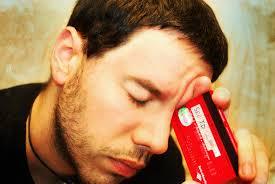Studies have shown that there is a direct correlation between stress levels and health complications. When energy is spent combating stress, it weakens your immune system, which can lead to declining health and an overall lower quality of life. These complications will usually bleed over to every aspect of your life, leading to more stress and more problems. For many years surveys have found that the biggest cause of stress for Americans is due to financial concerns, so it's easy to see that mismanaging your finances can have a lot more negative implications than you think.
How Poor Money Management Affects Your Health
Those who bear the weight of financial burdens may neglect their health in an attempt to save money; they may even go so far as to completely avoid healthcare because they do not have the means to pay it. A recent APA report, Paying with our Health, states that nearly 9% of Americans admit that they have considered omitting the healthcare they need because they were too concerned about the financial impact.
Financial stress can influence your appetite, mood, ability to focus, and even increase your blood pressure. High stress levels can increase the risk of a heart attack by 25%, risk of heart disease by 40%, and the risk of a stroke by 50%. In the worst cases, financial stress can hinder you from receiving necessary care due to an inability to pay; however, without proper care that stress might be killing you.
How Poor Money Management Affects Your Career
Your health is not the only thing negatively affected by poor money management habits. Your career can also take a costly toll from stressors caused by mismanaging your finances. As mentioned before, people with unhealthy money habits tend to carry the stress stemming from their financial troubles into all aspects of their life. Considering we spend about 30% of our life working, it's easy to see that our financial burdens can quickly affect our career.
If your unhealthy spending habits have put you in a place where you're constantly preoccupied with how you're going to pay the bills, your ability to focus on your job will severely suffer. Without taking action to overcome your economic troubles and remove the unnecessary stress, you'll be setting yourself up for poor job performance, possibly jeopardizing your career.
Even if you have the mental capacity to compartmentalize your financial stress and not let it affect your job performance, there are still ways that being irresponsible with your money can come back to haunt you on the job front. Occasionally, prospective employers require applicants to undergo a background check for employment, which can often include looking into your credit history and other financial information. If an employer sees that your credit report includes an excessive amount of negative marks or an overwhelming amount of debt, it can be interpreted that you are unorganized, unreliable, and irresponsible. It can also appear that you lack the skills to manage your personal finances appropriately, and therefore should not be put into a position of power to make decisions that could have a negative impact on the company.
5 Money Management Habits to Break Right Now
The first way to break the cycle of financial stress is to recognize the mistakes you are making. Getting your financial life in order will have a positive effect on every area of your life. These are the top 5 money management habits that you need to break if you want regain control of your financial well-being:
- Paying Bills Late: Late fees are expensive and can cost you as much as 10-15% of your monthly bill. That's additional money that could have been used to pay off debt or invest in your future. Frequently paying bills late damages your credit score, and leads to paying higher interest rates on future credit lines.
Once you begin to put an end to the vicious cycle of mismanaging your finances, you will quickly start to notice the positive effects of financial freedom. Having your financial life is in order will allow you to begin feeling more relaxed, focused, and ultimately less stressed out. These positive effects can carry over into the workplace, improve your health, and ultimately lead to a better quality of life.
This article originally appeared on www.comparecards.com/blog: Unexpected Effects of Poor Money Management.
